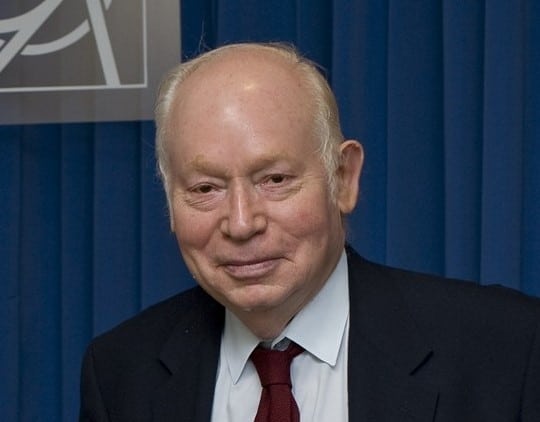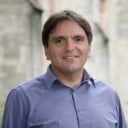THE PASSING OF A JASON
Steven Weinberg: the passing of science's most intellectual spokesman
As important as his Nobel Prize-winning technical accomplishments was his ability to communicate to the public.

Physicist Steven Weinberg, January 28, 2008.
- Theoretical physicist Steven Weinberg passed away on July 23.
- Due to his heavyweight intellect and unparalleled ability to communicate, he was science's most effective spokesman.
- His passing leaves a void in the world of science communication.
I recently read two Big Think articles (here and here) memorializing Steven Weinberg, who passed away last month. These articles were written by Marcelo Gleiser, a theoretical physicist, and they concern Weinberg's place in that field and its meaningfulness to a practitioner. Weinberg's role in creating the Standard Model and its candidate successor string theory rank him as possibly the greatest theorist of the last 60 years. He was also a giant in another field.
Weinberg was a science communicator — a writer, a speaker, a steady scientific advisor to decades of governments. In other words, he was a rare, true public intellectual. Beyond his Nobel Prize-winning technical accomplishments, he played a big part outside of his specialty: an exceptional spokesman for science.
Weinberg the spokesman
As a PhD student in his physics department — but more interested in science communication than in mathematical theory — I periodically encountered not the towering physicist but the spokesman. Walking along the theory floor I would occasionally see his door open. Men of Weinberg's stature have assistants, regulating the flow of visitors and maintaining a careful schedule. One time, his entire office was open and his assistant had stepped away, so I stuck my nose in. The rows of packed bookshelves were largely obscured. On that random day, a set of silvered umbrellas and stage lights were arranged about, preparing for the filming of some television show.
On film, Weinberg spoke for scientists on many matters: religion, philosophy, history, the meaning of mathematics, the story of everything. Many of these videos are freely available on the internet. These were not scripts for computer-generated movies of black holes. They were interviews and discussions. He professed himself to be "an unreconstructed believer in the importance of the word" despite "the ascendency of the culture of the image."
His book, The First Three Minutes — well before A Brief History of Time or The Elegant Universe — was one of the first books on cosmology written for the layman. Weinberg penned elegant essays on a wide array of topics outside of his research for publications such as The New York Times Book Review and Physics Today. These span astronauts to educated Texans and debates on Whig history to Israel. They have been published in a series of books over the past two decades, forming a style guide for a particular sort of popular science writing — not flashy but careful, intelligent, and clear of thought.
While Weinberg's fame was not as great as other science popularizers of recent decades, his gravitas outweighed them. Weinberg was widely read, carefully considered, and respectful of those with whom he disagreed.
Weinberg the statesman
His spokesmanship extended to government leadership and secret programs. Weinberg was an early member of the JASON advisory group. This body sought to recruit a panel of geniuses to advise U.S. government decision-makers on important matters. JASON's assessments included tactical nuclear weapons, magnetic gun fusion, the SDI ("Star Wars") program, the direction of the U.S. National Laboratories, and laser spacecraft propulsion. Much of this work is still classified
Weinberg as an elder statesman carried an aura. His deep authoritative speaking silenced the room. (When Weinberg came to a talk, the speaker was given a mark of importance and might be visibly intimidated.) We badly need voices like Weinberg's — carefully considered and polymathic — speaking up in our public debates and advising our leadership. His death leaves a void in that world.
- To the very beginning: going back in time with Steven Weinberg ›
- The first three minutes: a tribute to Steven Weinberg - Big Think ›
- Steven Weinberg (1933–2021) ›
- Steven Weinberg - Biographical - NobelPrize.org ›
- Steven Weinberg, Groundbreaking Nobelist in Physics, Dies at 88
JASON (advisory group) - Wikipedia
- Overview
- Membership
- Activities
- Chairs
- Early history
- Vietnam War
- Recent history
- Research
JASON members, known informally as "Jasons," include physicists, biologists, chemists, oceanographers, mathematicians, and computer scientists, predominated by theoretical physicists. They are selected by current members, and, over the years, have included eleven Nobel Prize laureates and several dozen members of the United States National Academy of Sciences. All members have a wide range of security clearances that allow them to do their work.
The JASON Society & The JASON Group - Red Ice
2007-06-08 · The Jason Society (Jason Scholars) - Former President Eisenhower commissioned a secret society known as the Jason Society (or Jason Scholars) under the leadership of the following; Director of Central Intelligence, Allen Welsh Dulles, Dr Zbigniew Brzezinski, President of the Trilateral Commission from 1973 until 1976, and Dr. Henry Kissenger, leader of the scientific effort, to sift through all the
Amazon.com: The Jasons: The Secret History of Science's ...
21 Aug 2021 Matin Durrani
Matin Durrani recalls his brushes with the Nobel-prize-winning physicist Steven Weinberg, who died on 23 July 2021 at the age of 88.

For reasons I can no longer quite remember, I was once invited to CERN to interview the Nobel-prize-winning theoretical physicist Steven Weinberg. I think Weinberg, who died last month, had travelled to Geneva to lecture on the development of the Standard Model of particle physics, in which he had played a key part, and there was time in his schedule for journalists like me to quiz the great man.
It’s usually the case that the simplest questions reveal the most illuminating answers, but that tactic, with Weinberg, was like asking someone who’d scaled Everest what they thought of the picnic tables at base camp. I was completely out of my depth.
If he was irritated or bored by my remarks, Weinberg was too polite to let it show.
If he was irritated or bored by my remarks, Weinberg was too polite to let it show and he responded with trademark lucidity and insight. He probably felt that anyone seeking a succinct explanation of his thinking should read one of his many books and essays, which set out his ideas precisely as he wanted.
The First Three Minutes remains one of the best popular books about cosmology, while his three-volume The Quantum Theory of Fields was vital for any serious theorist thirsting to make progress on nature’s inner workings.READ MORE

US Nobel-prize-winning physicist Steven Weinberg dies aged 88
Despite some misgivings, I wrote up the interview and e-mailed it to Weinberg to check. He replied pointing out a few errors I’d made near the start – and flatly refused to read it further. I shouldn’t have been surprised, given that Weinberg was used to working largely alone.
Most of his papers were single-authored, including “A model of leptons” (Phys. Rev. Lett. 19 1264), in which he described the unification of the electromagnetic and weak forces. Just three pages long, it led to his Nobel prize, which he shared with Abdus Salam and Sheldon Glashow, and remains one of the most highly cited papers of all time.
Weinberg’s approach was atypical in a world where thousands routinely collaborate – as they did, for example, to generate the first image of a black hole. But that’s not to say that Weinberg was a loner or curmudgeon. He enjoyed the arts and had a keen interest in the history of science, as I witnessed firsthand (see photo) at a session of the 2016 March meeting of the American Physical Society (APS), organized by Physics World columnist Robert Crease.READ MORE

A trip through Weinberg’s world
Speaking in the wake of his book To Explain the World, which outlined the development of the scientific method, Weinberg reminded delegates at the APS that he was unashamedly a “Whig historian”. The notion that we can only understand the past from the present enraged historians, but Weinberg’s position was at least clear and honest.
He defended his stance in a letter to Physics World a few months later, saying that René Descartes, for example, was flawed not because of his scientific errors but his “mistaken self-confidence” in his method for seeking truth. After all, as he wryly noted, “All scientists make scientific errors – even me.”
I just wish he’d corrected mine.

Matin Durrani is editor-in-chief of Physics World magazine
No comments:
Post a Comment